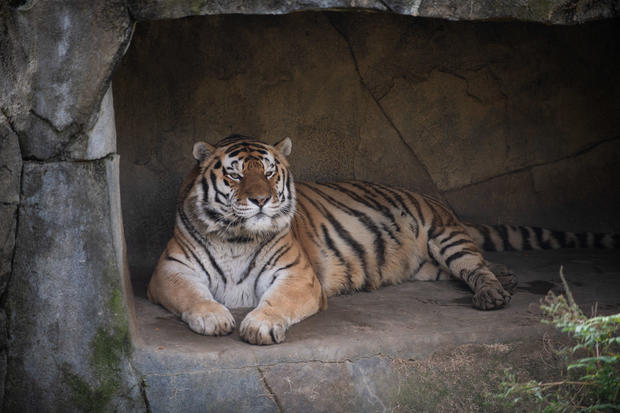A tiger at the Columbus Zoo Aquarium in Ohio died after developing pneumonia due to COVID-19. A 14-year-old Amur tiger named Jupiter said she was "more susceptible to the virus because she had long-term treatment for her chronic underlying disorder", the zoo said in a Facebook statement. I am saying.
Jupiter showed signs of illness earlier this month, the zoo said. He wasn't interested in eating and hesitated to stand, move, and interact with the zookeeper. After testing and treatment, the tiger did not improve. He appeared stable with additional treatment and testing, but died on Sunday.
Jupiter was born at the Moscow Zoo and was taken to the Columbus zoo in 2015 after spending time at the Dvorklarove Zoo in the Czech Republic. He had nine Cubs – six were born at the Columbus Zoo.

As a precautionary measure, zoo staff say they wear masks near certain animals that are susceptible to COVID-19. ..
Jupiter is the first animal to die of COVID-19 at this zoo. Many big catshave tested positive for the virusin zoos around the world, but few deaths have been reported.
In November 2021, three snow leopards at the Lincoln Children's Zoo in Nebraska died from complications of COVID-19, the zoosaid on Facebook. In June 2021, a 9-year-old Asian lion died at a national zoo in India after being infected with the virus,Reuters reports.
Some zoos are vaccinated with.However, at ZooTampa, Florida, 16- and 7-year-old tigers showed positive after showing "mild respiratory symptoms" despite being vaccinated. The zoo said it did not know how the tiger was infected with the virus,CBS Miami reports.
The Bronx Zoo tiger in New York is one of the tigers that tested the first positiveon COVID-19 in April 2020. It was a head. Heading. Since then, several large cats in the zoo have been positive. According to the United States Department of Agriculture's (USDA) National Institute of Veterinary Services, public health officials said they believed the cat became ill after being exposed to virus-infected zoo employees. At the beginning of the
pandemic, Chinese researchers studied COVID-19 in domestic cats, andfound that they were susceptible to aerial transmission by the coronavirus. Harbin Veterinary Research Institute scientists deliberately exposed groups of cats, dogs, ferrets, pigs, chickens, and ducks to the virus, according to a study published in . We have found that animals are more sensitive than other animals.Science
Dogs are less susceptible to the virus, and domestic animals such as pigs, chickens and ducks do not appear to be significantly affected by the virus.
Studies have found that both ferrets and cats appear to be susceptible to infection. However, this study was conducted by administering the virus to determine if the animal was infected with the virus. It does not mimic the way bacteria spread in real life. The New York City Animal Medical Center told CBS News.
Veterinarians say she has read countless studies examining coronaviruses in various animals, and many of her studies have not surprised her.
"Ferret has long been used to help people study upper respiratory tract diseases, study diseases, and make vaccines. Therefore, ferrets in the airways are ours. There is something that makes you more susceptible to illness. " "Looking at the genetics of cat receptors, cats and humans are almost the same."
Still, veterinarians, the CDC, and the US Department of Agriculture have continued during this pandemic. She said she was giving the same advice to pet owners. "Wash your hands before touching your pet and after touching your pet. If you are ill, wear a mask. Instead of taking care of your pet, have an agent who takes care of your pet. Find out. You can isolate yourself from the whole family, including all pets, "says Hohenhaus.
In the guidance updated in April 2022, the CDC has a low risk of animals spreading COVID-19 to humans, but the virus may spread from human to animal during close contact. I said there is.
"Understanding how SARS-CoV-2 spreads between humans and animals requires further research and monitoring." CDC,COVID-19 People who are suspected or confirmed should avoid contact with animals such as pets, livestock and wildlife.

Caitlin O'Kane is CBS News and its leading news brandThe Uplift
Thank you for reading CBS NEWS.
She can create a free account or log in to
to take advantage of other features.


